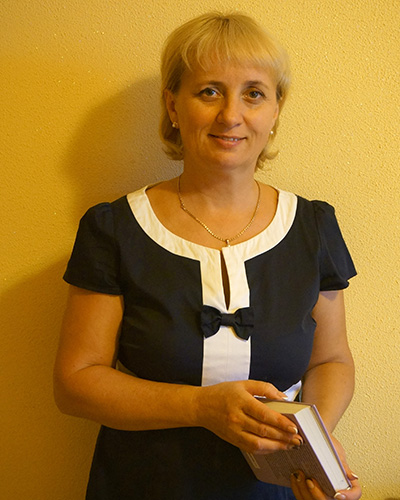|
 UDC 332.135:339.94; JEL R11, R23
UDC 332.135:339.94; JEL R11, R23
Benovska, L. (2020). Prykordonni terytoriyi u nespryyatlyvykh suspil'no-ekonomichnykh umovakh: identyfikatsiya ta problemy rozvytku [Border areas in adverse socio-economic conditions: identification and development problems]. In Sotsial'no-ekonomichni problemy suchasnoho periodu Ukrayiny [Socio-Economic Problems of the Modern Period of Ukraine]: Vol. 142 (2) (pp. 25-31). DOI: https://doi.org/10.36818/2071-4653-2020-2-4. [in Ukrainian].
Sources: 10
Authors
Benovska Liliya YaroslavivnaPh.D. of Economics, Senior Researcher
Leading Researcher, Scientific Secretary of the unit of the Department of regional financial policy of the Dolishniy Institute of Regional Research of NAS of Ukraine
Contacts:  lbenovska11@gmail.com lbenovska11@gmail.com
Webpages:         
ResumeThe war in Eastern Ukraine resulted in the creation of a new type of problem regions - border areas in adverse conditions. It is a specific type of territory, the configuration of which may change under the influence of the political situation. The main feature of such areas is the need for an additional level of security. The allocation of border areas into a separate group requires in-depth theoretical and empirical research. The purpose of the article is to identify border areas in adverse conditions and outline the main problems of their development. The following methods were used for the study: statistical, historical, abstract and logical, systematic and comparative analysis. In the article, the border areas in adverse conditions are allocated into a separate group of problem regions of Ukraine and their intragroup structuring is carried out according to certain criteria: the degree of security of the territories and their involvement in hostilities, the type of border with the aggressor state (land, sea), the activity and nature of the conflict with the aggressor state, or the state with which the relationships require a sufficient level of security. The analysis of the main indicators of social and economic development of border areas in adverse conditions is carried out. The problems of territorial development inherent in all subgroups of border areas in adverse conditions (remoteness from economic development centers; increased migration; threat of military conflicts; low investment attractiveness) and specific problems within each subgroup are highlighted. The task of regional policy is to support the development of border areas in adverse conditions. The mechanisms for regulating the development of such areas should be developed separately for each of the selected subgroups. These mechanisms should help to strengthen the economic potential of these territories and state support for their social and economic development, as well as stimulate entrepreneurial activity in border areas, etc.
Keywords:problem areas, border areas, development, threat, security
References- Vakhovych, I. M., & Kupyra, M. I. (2014). Obhruntuvannya sutnosti ekonomichnoyi katehoriyi «depresyvnyy rehion» [Substantiation of the essence of the economic category «depressed region»]. In Ekonomichni nauky. Seriya: Rehional’na ekonomika [Economic sciences. Series: Regional economy]: Vol. 11(43) (pp. 27-34). [in Ukrainian].
- Yefymenko, T. I. (2011). Instytutsiyne rehulyuvannya ekonomichnoho rozvytku [Institutional regulation of economic development]. Ekonomika Ukrayiny – Economy of Ukraine, 1, 16-26. [in Ukrainian].
- Storonyanska, I. Z., & Benovska, L. Ya. (2018) Prostorovi asymetriyi ekonomichnoho rozvytku v umovakh administratyvno-finansovoyi detsentralizatsiyi [Spatial asymmetries of economic development in conditions of administrative and financial decentralization]. Ekonomika Ukrayiny – Economy of Ukraine, 2, 50-64. [in Ukrainian].
- Shults, S. L. (2014). Rehional’na polityka v Ukrayini: evolyutsiyni zasady ta stratehichni perspektyvy [Regional policy in Ukraine: evolutionary principles and strategic perspectives]. Rehional’na ekonomika – Regional economy, 3, 26-36. [in Ukrainian].
- Matviyishyn, Ye. H., & Nyema, O. S. (2009). Zarubizhnyy dosvid nadannya derzhavnoyi pidtrymky rozvytku potentsialu vidstalykh i depresyvnykh terytoriy [Foreign experience in providing state support for the development of the potential of backward and depressed areas]. Demokratychne vryaduvannia – Democratic governance, 3, 43-50. [in Ukrainian].
- Yaroshenko, I. V. (2014). Mekhanizmy derzhavnoyi pidtrymky problemnykh rehioniv [Mechanisms of state support of problem regions]. In Modelyuvannya rehional’noyi ekonomiky [Modeling of the regional economy]: Vol. 1 (pp. 133-149). [in Ukrainian].
- Derzhavna stratehiya rehional’noho rozvytku na period do 2027 roku: «Rozvytok ta yednist’, oriyentovani na lyudynu» [State strategy of regional development for the period up to 2027: «Development and unity focused on people»]: Project (2019). Retrieved from http://www.strategy.kharkiv.ua/docs/SSRD.pdf [in Ukrainian].
- Detsentralizatsiya v Ukrayini ta yiyi vplyv na sotsial’no-ekonomichnyy rozvytok terytoriy: metodychni pidkhody ta rezul’taty otsinyuvannya [Decentralization in Ukraine and its impact on the socio-economic development of territories: methodological approaches and evaluation results]: Scientific report (2018). Lviv: Dolishniy Institute of Regional Research of NAS of Ukraine. Retrieved from http://ird.gov.ua/irdp/p20180705.pdf [in Ukrainian].
- Tsili staloho rozvytku dlya Ukrayiny: rehional’nyy vymir [Sustainable development goals for Ukraine: regional dimension]: Analytical report (2018). Lviv: Dolishniy Institute of Regional Research of NAS of Ukraine. [in Ukrainian].
- Yermolayev, A., Lupatsiy, V., & Markyeyeva, O., et al. (2014). Ukrayins’kyy Pivden’: suchasni vyklyky ta stratehichni priorytety rozvytku [Ukrainian South: current challenges and strategic development priorities]: Scientific report. Kyiv: ISS. Retrieved from http://newukraineinstitute.org/media/news/482/file/New%20South.pdfНermolaiev [in Ukrainian].
|